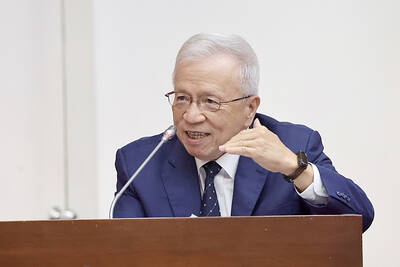Since the Taiwan Lottery Co (台灣彩券公司) started issuing lottery tickets on Jan. 1, it has created 163 multimillionaires as of the end of last month. Sagittarian players were the luckiest, accounting for 18 percent of winners.
Among them, six walked away with prizes worth more than NT$100 million (US$3 million) from Big Lotto (大樂透). Another 16 won prizes worth more than NT$10 million from Big Lotto and Lotto (樂透彩).
The largest cash prize ever awarded was NT$726,486,142 (US$21,752,385), the nation's exclusive Public Welfare Lottery operator said yesterday.
A survey of big winners showed 72 percent were men and only 28 percent were women. Forty-four percent lived in Taipei.
Nearly 30 percent of the winners are aged between 40 and 49. Thirty-nine percent who turned rich overnight were office workers earning monthly salaries of between NT$30,000 and NT$49,999.
Sharing their winning tips, 68 percent of the winners said they had used randomly chosen numbers from lotto machines, while 23 percent had used their lucky numbers.
Before claiming their cash, most winners carefully placed the winning tickets in wallets, cabinets, desks or cars, and a handful hid them in books, household shrines or refrigerators.
Keeping a low key, 96 percent of the multimillionaires chose to stay at their jobs.
Some players missed the once-in-a-lifetime opportunity, failing to cash in winning tickets within the three-month deadline. A total of NT$29.68 million in prizes went unclaimed.

JITTERS: Nexperia has a 20 percent market share for chips powering simpler features such as window controls, and changing supply chains could take years European carmakers are looking into ways to scratch components made with parts from China, spooked by deepening geopolitical spats playing out through chipmaker Nexperia BV and Beijing’s export controls on rare earths. To protect operations from trade ructions, several automakers are pushing major suppliers to find permanent alternatives to Chinese semiconductors, people familiar with the matter said. The industry is considering broader changes to its supply chain to adapt to shifting geopolitics, Europe’s main suppliers lobby CLEPA head Matthias Zink said. “We had some indications already — questions like: ‘How can you supply me without this dependency on China?’” Zink, who also

At least US$50 million for the freedom of an Emirati sheikh: That is the king’s ransom paid two weeks ago to militants linked to al-Qaeda who are pushing to topple the Malian government and impose Islamic law. Alongside a crippling fuel blockade, the Group for the Support of Islam and Muslims (JNIM) has made kidnapping wealthy foreigners for a ransom a pillar of its strategy of “economic jihad.” Its goal: Oust the junta, which has struggled to contain Mali’s decade-long insurgency since taking power following back-to-back coups in 2020 and 2021, by scaring away investors and paralyzing the west African country’s economy.

BUST FEARS: While a KMT legislator asked if an AI bubble could affect Taiwan, the DGBAS minister said the sector appears on track to continue growing The local property market has cooled down moderately following a series of credit control measures designed to contain speculation, the central bank said yesterday, while remaining tight-lipped about potential rule relaxations. Lawmakers in a meeting of the legislature’s Finance Committee voiced concerns to central bank officials that the credit control measures have adversely affected the government’s tax income and small and medium-sized property developers, with limited positive effects. Housing prices have been climbing since 2016, even when the central bank imposed its first set of control measures in 2020, Chinese Nationalist Party (KMT) Legislator Lo Ting-wei (羅廷瑋) said. “Since the second half of

AI BOOST: Next year, the cloud and networking product business is expected to remain a key revenue pillar for the company, Hon Hai chairman Young Liu said Manufacturing giant Hon Hai Precision Industry Co (鴻海精密) yesterday posted its best third-quarter profit in the company’s history, backed by strong demand for artificial intelligence (AI) servers. Net profit expanded 17 percent annually to NT$57.67 billion (US$1.86 billion) from NT$44.36 billion, the company said. On a quarterly basis, net profit soared 30 percent from NT$44.36 billion, it said. Hon Hai, which is Apple Inc’s primary iPhone assembler and makes servers powered by Nvidia Corp’s AI accelerators, said earnings per share expanded to NT$4.15 from NT$3.55 a year earlier and NT$3.19 in the second quarter. Gross margin improved to 6.35 percent,